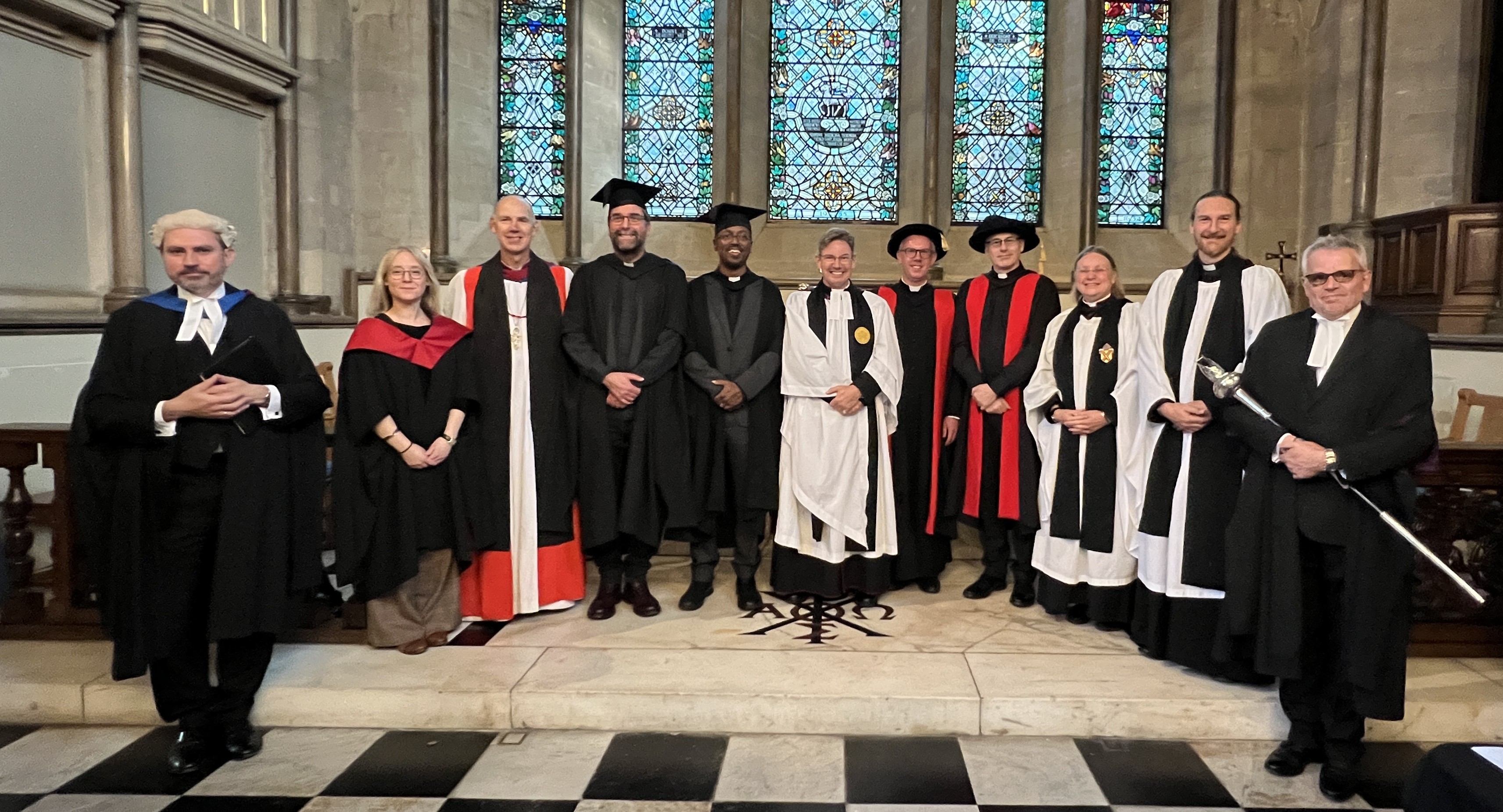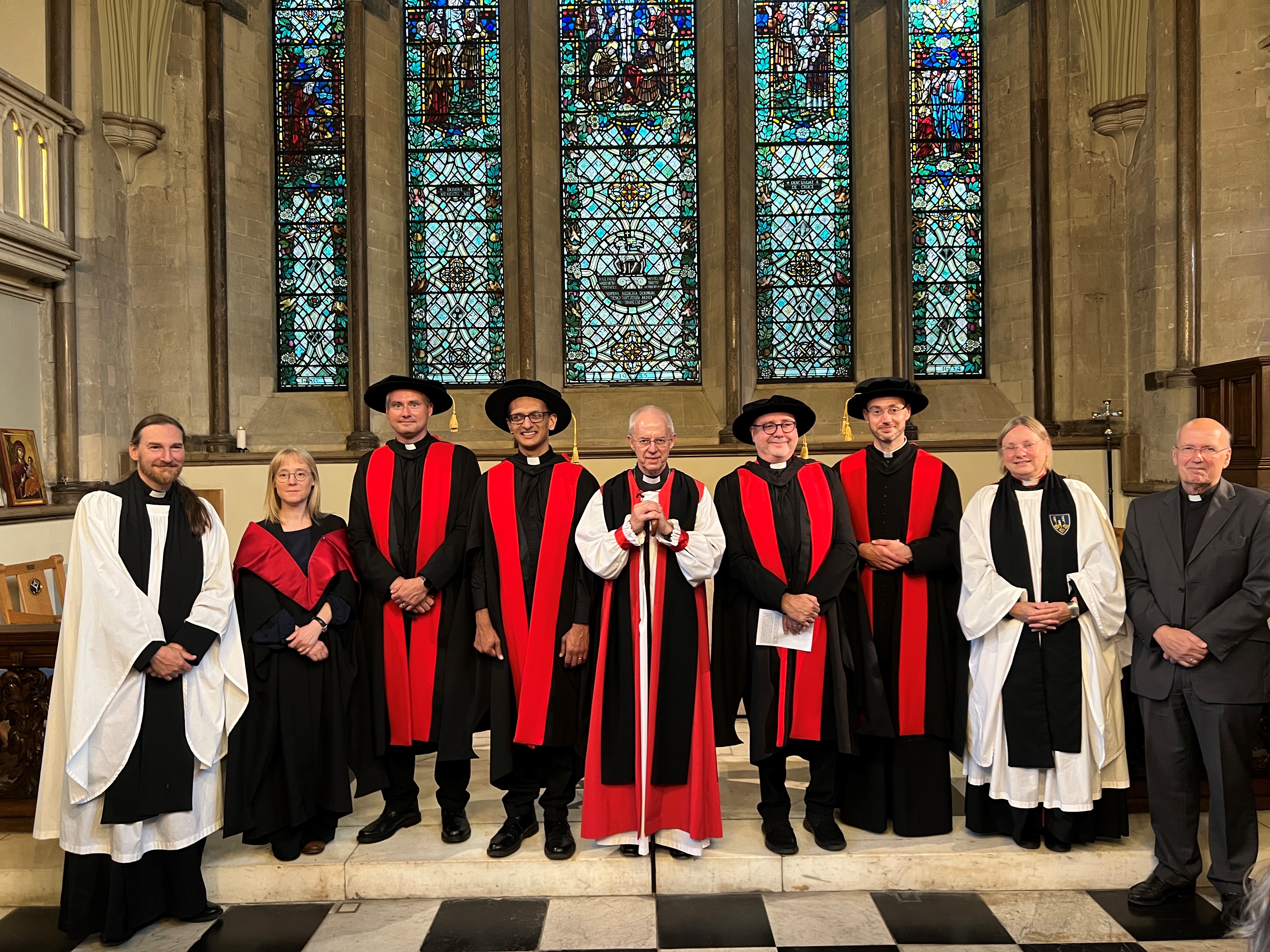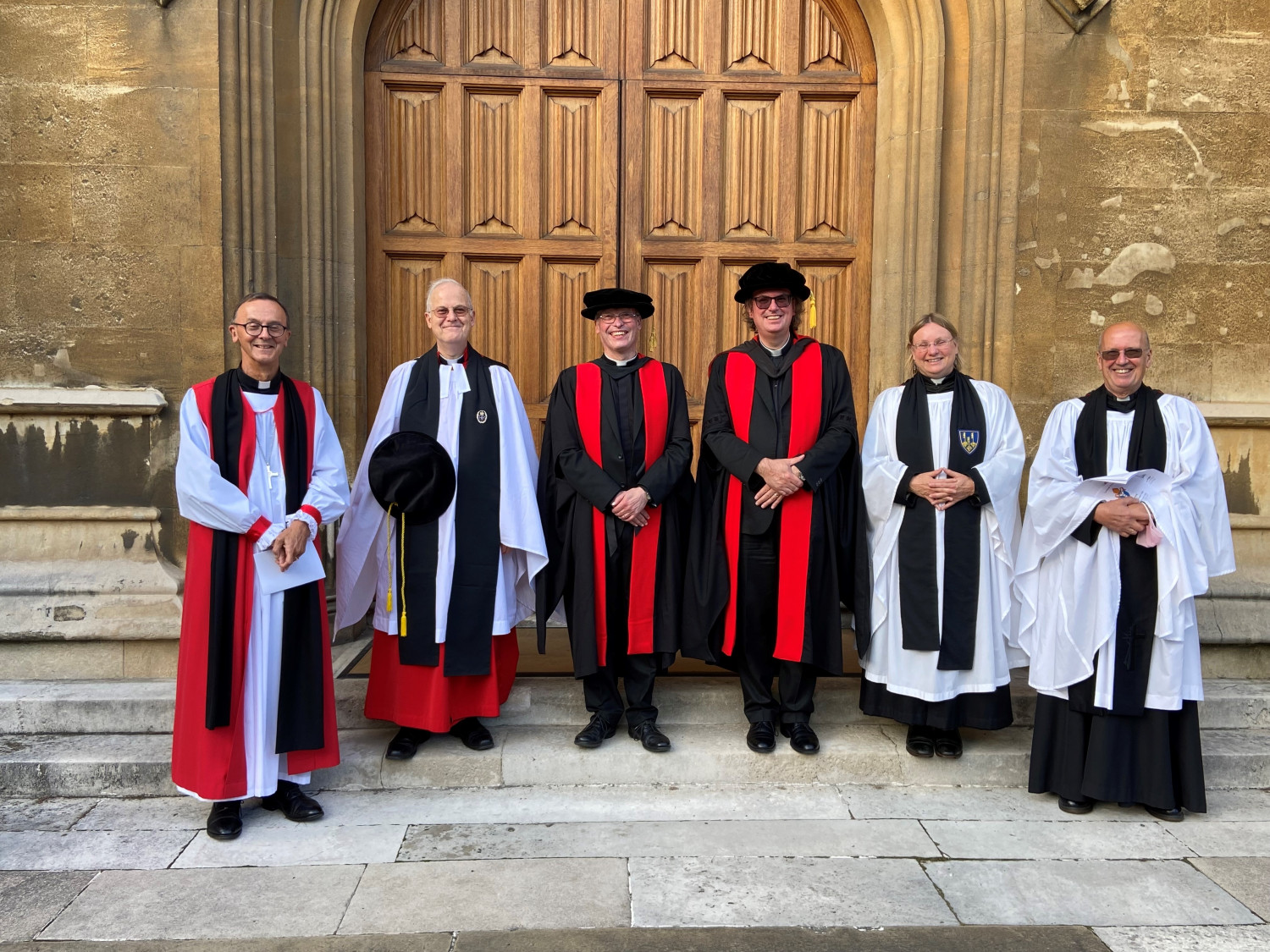|
The next application deadline, for 2027/28 entry, is Monday 18 January 2027, at 5pm (1700) UK time.
To access and download the application pack, click the 'Enquire' tab at the top of the home page.
(The closing date for applications for entry in the academic year 2026-27 was Monday 19 January 2026)
LRDT annual application deadline.
Since the academic year 2023-24 applicants for admission to the LRDT need to apply by the advertised closing date. We decided to introduce this procedure because of the success of the LRDT scheme, which attracts more applicants than can be accommodated. This represents a departure from the previous position in which we were able to process applications throughout the year. We realise that this change may not be welcomed by all but it enables us to continue to ensure that the best applicants are accepted on to the scheme.
Graduation Evensong 2025
On 24th September 2025 the Venerable Dr Will Adam, Archdeacon of Canterbury, conferred postgraduate degrees by research on four graduates, Erik Peeters (MPhil), Steve Muneza (MPhil), James Crockford (PhD) and Steve Stewart (PhD). Many congratulations to them all on their achievements.

The titles of the theses for which the degrees were conferred are:
Erik Peeters: 'Faith and Encounter: Un-knowability as Problem in Works by Marcella Althaus-Reid and Amso Yong'
Steve Muneza: 'Ethical Entrepreneurship for Sustainable and Integral Development in Burundi'
James Crockford: 'Music to Your Ears: Embodied Delight and Social Dialogue in Augustine's De musica'
Steve Stewart: The Law of Moses in John's Prologue: the Law as Central to a Jewish Fourth Gospel'
A printed copy of each thesis is deposited in Lambeth Palace Library and can be consulted there on request.
________________________________________________________________________________________________________________
In Lambeth Palace on 20 September 2024, during a service of Evening Prayer, the Archbishop of Canterbury, the Most Reverend Justin Welby, conferred in person Lambeth PhDs on four graduands who had fulfilled the requirements of supervised research, thesis and examination under the Lambeth Research Degrees in Theology scheme.

Following the conferral, the four graduates present, seen in the photograph, are, from left to right, The Reverend Stephen Proudlove, The Reverend Jitesh Patel, The Reverend Canon Ian Mobsby and The Reverend Justin Pottinger. The Reverend Jonathan Douglas, who was unable to be present, received his degree in absentia. Also seen in the photo are, from left to right, Mark Laynesmith (Academic dean), Helen Lunnon (Administrator), Archbishop Justin, The Reverend Canon Jessica Martin (Director) and the Reverend Dr Nick Fisher (former Academic Dean and himself a graduate of the scheme).
The Archbishop congratulated the five graduates on their achievements and thanked them for the contributions which they had made to contemporary theological thinking.
The titles of the five theses for which these doctorates were awarded were as follows:
The Reverend Jonathan Douglas: 'Exploring the intersection of health and growth within Anglican parish life.'
The Reverend canon Ian Mobsby: 'God’s Kenosis, our Theosis: A Practical Theology Enquiry into Mission and the Spiritual But Not Religious (SBNR)'.
The Reverend Jitesh Patel: 'Postmodernism and the Charismatic Movement in the Church of England'.
The Reverend Justin Pottinger: 'A Theological reflection on episcopal ministry in the Church of England as expressed in Common Worship: Ordination Services and informed by a contemporary reading of the Rule of St Benedict'. Information on Revd Pottinger's published book is available here: The Bishop and the Baptized. About his experience as a Lambeth student and his new book Justin commented: 'As a rural vicar, the structure and cost of LRDT gave me the opportunity to undertake post-graduate research which otherwise would not have been possible. It also meant that my research was integrated with my experience of ministry within the CofE. This book brings together the need for change, that I have heard widely expressed, with an academic rationale for that change.'
The Reverend Stephen Proudlove: 'Apologetics and the appeal to the imagination through narrative: Alister McGrath and the potential and pitfalls of narrative apologetics'.
Lambeth Graduation September 2022
In September 2022 Lambeth (LRDT) PhDs were awarded on the basis of examination to Dr Stephen Duckett, whose thesis was entitled Healthcare Funding and Christian Ethics and to Peter Jones for his thesis, Es ist eine Frage der Begriffsbestimmung: A Study in the concept of the 'Whole Animal.' Dr Duckett’s thesis was published in January 2023 by Cambridge University Press under the title Healthcare Funding and Christian Ethics.
On 01 April 2022 Sacristy Press published ‘Catholic Bishops of Hexham and Newcastle’ by Dr Paul Severn, who received his Lambeth PhD through the LRDT in 2019. You can read more about the book here.
ON 27 SEPTEMBER 2021 THE RIGHT REVEREND JOHN INGE,
BISHOP OF WORCESTER AND CHAIR OF THE COUNCIL OF THE AET/LRDT,
CONFERRED PhD DEGREES ON TWO NEW GRADUATES
ON BEHALF OF THE ARCHBISHOP OF CANTERBURY
The graduates this year were Michael Hopkins and Paul Williams.
The title of Michael’s thesis was 'An exploration of the lineage of the orthodox presbyterian tradition in England, with particular reference to the Presbyterian Church of England (1876-1972)’, in which Michael examined the history of one of the protestant nonconformist churches in England, now part of the United Reformed Church.
The title of Paul's thesis was 'Chasing the Lady: The Virgin Mary in Early Modern English Liturgical Texts, 1534-1563', in which Paul examined the doctrine and devotion of the Virgin Mary in the Missal and Book of Hours on the eve of the Reformation in England and then developed in public and private liturgical texts authorised by Henry VIII and his children: Edward, Mary and Elizabeth.'

Malcolm Torry's book 'Actology' - based on his AET/LRDT thesis - has been published by Resource Publications/WIPF and Stock
Two streams run through the Western philosophical tradition: one characterized by Being, beings, the unchanging, the static, and the unitary; and the other by Action, actions, the changing, the dynamic, and the diverse. The book explores the 'Action' stream as it has wound its way through history, and enables us to create the beginnings of an 'actology': a way of seeing ourselves, the universe, and God, in terms of actions in patterns rather than as beings that change.
You can find out more about the book, published in August 2020, on the publisher’s website.
Dr Nick Fisher's book on Symon Patrick - based on his AET/LRDT thesis - has been published by Cambridge Scholars Publishing
History has not been kind to Bishop Symon Patrick (1626-1707). His fifty years of ministry spanned the closing years of Cromwell’s rule and the start of Queen Anne’s reign, and ranged from service as a Church of England minister in the fashionable London parish of St. Paul's, Covent Garden, to appointment as the 'Latitudinarian' Bishop of Ely. Recognised by his contemporaries as one of the three or four leading clergy of his generation, he wrote over one hundred books, that helped to define the Established Church as it moved from a confrontational fundamentalism to the broad tolerance that exists today. This book assesses the significance and quality of Patrick’s contribution to the Church of England, carefully placing it against the background of the history and politics of the time. It was reviewed in the Church Times on 09 August 2019.
DARTON, LONGMAN, TODD PUBLISH FR LUKE PENKETT'S BOOK ON HENRI NOUWEN TOUCHED BY GOD'S SPIRIT
BASED ON HIS 2017 LAMBETH PhD THESIS
Henri Nouwen is internationally acclaimed as one of the most beloved and important spiritual writers of the second half of the twentieth century, yet little has been written on Nouwen’s own mentors, especially on those who influenced him the most: Thomas Merton, Vincent Van Gogh, Jean Vanier and Rembrandt Van Rijn. Nouwen encountered Merton in May, 1967. He began to learn about the art and writing of Van Gogh in 1975. He met Vanier in 1981. The painting of the Prodigal Son Nouwen came across in 1983.
Touched by God's Spirit brings these four masters of the spiritual life together and their significant contribution, notably, to compassionate Christian living as expressed by Nouwen is studied in depth.
You can read Mark Oakley's review of the book in the Church Times here.
TWO LAMBETH DEGREES AWARDED IN SEPTEMBER 2018
On Monday 24 September 2018 Bishop John Inge, Chair of the Council of the Archbishop’s Examination in Theology/Lambeth Research Degrees in Theology, conferred degrees, on behalf of the Archbisop, on two students who had undertaken original research, submitted theses which were examined both internally and externally, and had defended them in further viva voce examinations.
The Reverend Dr Nick Fisher received the degree of PhD for his thesis entitled, ‘Symon Patrick (1626-1707) and his contribution to the post-1660 Restored Church of England’.
The Reverend Dr Malcolm Torry received the degree of MPhil for his thesis entitled, ‘Action, change and diversity in the Western philosophical tradition: Towards an ‘action’ metaphysic as a basis for Christian apologetics’ .

Before the degree ceremony, the annual AET Education Day Lecture was given to a diverse audience of bishops’ nominees by Professor Allan Anderson BTh, MA, MTh, DTh, Professor of Mission and Pentecostal Studies in the Department of Theology and Religion at the University of Birmingham. Professor Anderson spoke on ‘The Holy Spirit in an African Spirit-Filled World’. His talk was followed by a lively session of questions and answers from his enthusiastic hearers.



LAMBETH RESEARCH DEGREES IN THEOLOGY (LRDT) - the new 'brand' of the AET.
The Council of the Archbishop’s Examination in Theology (AET) have decided to adopt a new ‘brand’ for the scheme. It will henceforth be referred to as Lambeth Research Degrees in Theology (LRDT). This change is being made to emphasise the research nature of these postgraduate degrees and to introduce the word Lambeth. Those receiving these degrees have always been entitled to use the postnominal titles MPhil (Lambeth) or PhD (Lambeth) but their link to the AET seemed insufficiently clear. The Council hope that this change will also emphasise the fact that the standing of these Lambeth postgraduate degrees by research, thesis and examination is equal to those from the best universities in the country. The Archbishop’s Examination in Theology (AET) remains the legal name of the scheme, as registered with the Charity Commission and other regulatory bodies, whilst Lambeth Research Degrees in Theology (LRDT) becomes the new ‘trading name’. This change of name has no impact on the high status of these Lambeth research degrees, past or future.
2017 CLOSURE OF LAMBETH DIPLOMA ASSOCIATION
CLOSURE OF THE LAMBETH DIPLOMA ASSOCIATION
The following statement was received from the Lambeth Diploma Association, who generously agreed that, with the winding up of the LDA in 2014, the residual funds of the Association, when all obligations had been met, should be disbursed for the benefit of theological education. The residual finds were accordingly transferred to the AET for such disbursement.
The Lambeth Diploma Association (LDA) was formed as the organisation for alumni of the Archbishop’s Examination in Theology (AET), originally holders of the Diploma. Following discussion at the Lambeth Diploma Association AGM, the Committee was charged with assessing and making a final decision on the future of the Association. This move was prompted by the following circumstances: numbers attending meetings had dwindled over many years; the interest members undoubtedly felt in the Association had become largely passive, with little response to newsletters and appeals for views on the Association; changes in the Degree programme meant that fresh membership was unlikely to be attracted to this organisation. For all these reasons, it appeared that the Association lacked the critical mass to survive actively, owing to members’ other priorities or infirmity. Those present at the Committee meeting, supported by those unable to attend, voted with regret to draw the Association to a close.
A closure meeting at Lambeth Palace took place on 26 February 2016 to receive the Accounts, and the Minutes of the last AGM and Committee Meeting of the Association. In ratifying the Committee’s decision to close, those present at this meeting wished to affirm the following on behalf of members of the Association:
- All award holders, as alumni of the AET, value their qualifications and are grateful for the opportunities that these qualifications have provided for personal study and development, and service to education and ministry. None of these benefits to themselves or to the Church is diminished by the demise of the Association.
- They have appreciated the fellowship of the LDA, and the encouragement and hospitality provided by Lambeth Palace.
- At its inception in 1905, the Lambeth Diploma met the unprecedented challenge of providing women with the qualifications to enable them to teach Religious Education. Holders of the Diploma and the more recent MA are pleased to see that the tradition of meeting the educational challenges facing the Church continues in the provision of the latest AET Degree programme, and they pray for its success and the benefit it will bring to individuals and to the Church.
May 2017.
2016 AET PhD Awarded
On Friday 02 September 2016 Archbishop Justin conferred the degree of PhD on Dr Paul Severn, for his thesis entitled, ‘The Christology of St Anthony of Padua’. In his thesis Paul demonstrates that, although the Christological thought of St Anthony of Padua is deeply embedded in the traditions of medieval scholarship, in the modern era his work - and particularly his integrative theological method - have gained renewed respect.
2015 Three AET PhD degrees awarded
Archbishop Justin Welby presented PhD degrees to the Revd Robert Chapman, the Revd Lyndon Shakespeare and the Revd Antony Hodgson at a ceremony in Lambeth Palace Chapel on 8th September, 2015. Robert Chapman’s doctoral thesis was entitled, ‘Eucharistic Sacrifice as missionary gift in Mission-shaped Church’, Lyndon Shakepeare’s ‘The Material Body and the Managed Church: A Thomistic Vision of the Church in the Age of Organization’ and Antony Hodgson’s ‘The origins and evolution of suffragan bishops in the Church of England: A historical perspective’.
2014 The Archbishop awards two AET PhD degrees
The Rt Revd John Inge, chairman of the AET Council, on behalf of Archbishop Justin, presented AET PhD degrees to the Revd James Wellington and Fr. Luke Penkett at a ceremony in Lambeth Palace Chapel on 9th October, 2014. James Wellington’s doctoral thesis was entitled, ‘Christe Eleison! The Invocation of Christ in Eastern Monastic Psalmody c.350-c.450’ and Luke Penkett’s ‘Finding One Another in Christ: Ecumenism in the Life and Writing of Henri J. M. Nouwen’
2014 Lecture on God’s Involvement with Evil
Les Oglesby (AET PhD 2012) gave a lecture entitled, ‘God’s Involvement with Evil: Jung and Balthasar – A Dialogue’ to the Guild of Pastoral Psychology, London, in November, 2014, exploring Jung’s and Balthasar’s approaches to the reality of evil, to the question of evil in relation to the Trinity and to how each man understood the Cross providing insights about God and evil. The lecture has been published as a Guild Paper (No. 317, January, 2015).
2014 Article published: C. G. Jung and Karl Stern
Les Oglesby (AET PhD 2012) has published an article which offers a commentary on a recently discovered letter from Jung to Karl Stern. Jung’s hopes for a fruitful dialogue with Stern are based more in Jung’s own long-term desire for dialogue with theology than in Stern’s use of Jung in his own version of a Freudian approach to psychoanalysis. Nevertheless, there is common ground in a shared sense that this is an ‘imperilled age’. The possibilities for dialogue are set within a heuristic frame that reads Stern’s Christian personalism as a contextualising theology and Jung’s dialectical psychology as a reinterpretative project in relation to theology. This facilitates a discussion of the issues of metaphysics and psychology, teleology, and analogy. Whatever mutual benefit they might have derived from these areas of dialogue, their journey together might well have foundered once Jung’s own theological commitments had become clear.
(‘Could C. G. Jung and Karl Stern “go a stretch together … with mutual profit“?’ InInternational Journal of Jungian Studies, 6(3), pp. 189-204, October, 2014,http://dx.doi.org/10.1080/19409052.2014.925484 )
2014 Book publication: Christe Eleison
James Wellington (AET PhD 2014) has published Christe Eleison! The Invocation of Christ in Eastern Monastic Psalmody c.350-c.450 (Peter Lang). For centuries the Jesus Prayer has been leading Orthodox Christians beyond the language of liturgy and the representations of iconography into the wordless, imageless stillness of the mystery of God. In more recent years it has been helping a growing number of Western Christians to find a deeper relationship with God through the continual rhythmic repetition of a short prayer which, by general agreement, first emerged from the desert spirituality of early monasticism. In this study James Wellington explores the understanding and practice of the psalmody which underpinned this spirituality. By means of an investigation of the importance of psalmody in desert monasticism, an exploration of the influence of Evagrius of Pontus and a thorough examination of selected psalm-commentaries in circulation in the East at this time, he reveals a monastic culture which was particularly conducive to the emergence of a Christ-centred invocatory prayer.
|







 The LRDT supports students through supervision, research training and individual attention.
The LRDT supports students through supervision, research training and individual attention.
 The AET costs less than comparable programmes and financial support may be available.
The AET costs less than comparable programmes and financial support may be available.







